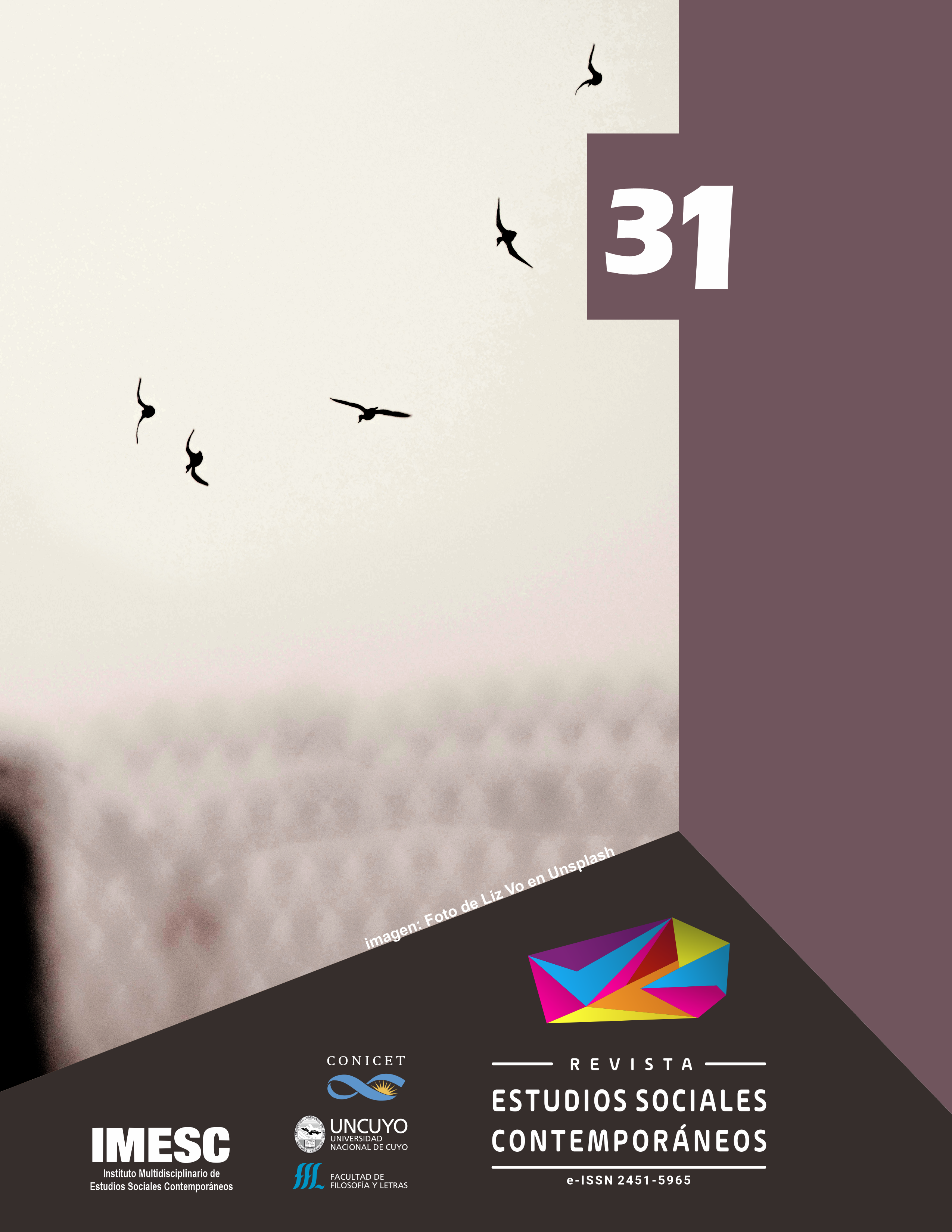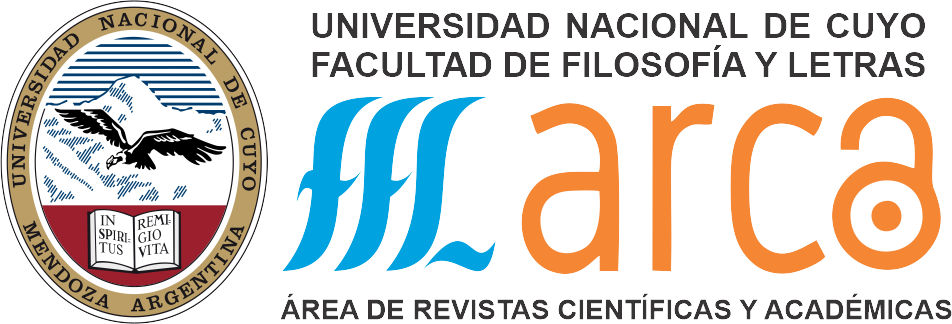El miedo en los tiempos del COVID-19
Un acercamiento desde Thomas Hobbes
DOI:
https://doi.org/10.48162/rev.48.082Palavras-chave:
Hobbes, Cuerpo, Pasiones, Miedo, COVID-19Resumo
Este artículo procederá en tres tiempos. En un primer apartado, buscaremos describir el materialismo propio del filósofo inglés y cómo la noción predilecta de la materia, el cuerpo, es el asiento de las pasiones. Luego, explicaremos la manera en que el afecto del miedo aparece tematizado –con sus correspondientes variaciones– en un conjunto de obras hobbesianas. Por último, reflexionaremos sobre las distintas miradas que existen sobre la pandemia del COVID-19 y las respuestas de los gobiernos del mundo frente a ella a partir de los análisis realizados por Hobbes en torno al miedo. El Estado aparecerá así como un agente indispensable para el control del miedo.
Referências
Agamben, G. (2020) ¿En qué punto estamos? La epidemia como política. Adriana Hidalgo.
Altheide, D. L. (2009). Terrorism and the Politics of Fear. En U. Linke y D. Taana Smith (Eds.), Cultures of Fear. A Critical Reader (pp. 54-99). Pluto.
Balzi, C. (2019). Introducción. En T. Hobbes, Leviatán (pp. VII-CCVIII). Colihue.
Bartra, A. (2022). Exceso de muerte. De la peste de Atenas a la COVID-19. Fondo de Cultura Económica.
Berardi, B. (2022) El tercer inconsciente. La psicoesfera en la época viral. Caja Negra.
Botting, E. H. (2020). A Novel (Coronavirus) Reading of Hobbes’s Leviathan. History of European Ideas, 47(1), 33-37.
Bratton, B. (2021). La terraformación. Programa para el diseño de una planetariedad viable. Caja Negra.
Bratton, B. (2022). The Revenge of the Real. Politics for a Post-pandemic World. Verso.
Buzan, B. (1983). People, States, and Fear. The National Security Problem in International Relations. Wheatsheaf.
Castany Prado, B. (2022). Una filosofía del miedo. Anagrama.
Châtelet, F. y Pisier-Kouchner, É. (1986). Las concepciones políticas del siglo XX. Espasa-Calpe.
Cosentino, G. (2020). Social Media and The Post-Truth World Order. The Global Dynamics of Disinformation. Palgrave Macmillan.
D’Ancona, M. (2017). Post truth: the new war on truth and how to fight back. Ebury.
Davis, M. (2020). Llega el monstruo. COVID-19, gripe aviar y las plagas del capitalismo. Capitán Swing.
Degerman, D., Flinders, M. y Johnson, M. T. (2020). In Defence of Fear: COVID-19, Crises and Democracy. Critical Review of International Social and Political Philosophy, 26(6), 788-809.
Descartes, R. (2005). Prefacio al lector. En Meditaciones metafísicas (pp. 115-120). KRK.
Estacio, P. (1888). La tebaida. De la Viuda de Hernando y Cía..
Frateschi, Y. (2008). A física da política. Hobbes contra Aristóteles. UNICAMP.
Freund, J. (1980). La thème de la peur chez Hobbes. Revue Européenne des sciences sociales, 18(49), 13-32.
Frost, S. (2008). Lessons from a materialist thinker. Stanford University.
Frost, S. (2013). Body. En S. A. Lloyd (Ed.), The Bloomsbury Companion to Hobbes (pp. 29-31). Bloomsbury Academic.
Furedi, F. (2002). Culture of Fear. Risk-Taking and the Morality of Low Expectation. Continuum.
Furedi, F. (2007). Politics of Fear. Beyond Left and Right. Continuum.
Gauthier, D. (1969). The Logic of Leviathan. Oxford University.
Ginzburg, C. (2015). Miedo, reverencia, terror: releer a Hobbes hoy. Apuntes de Investigación del CECYP, 26, 30-49.
Glassner, B. (2000). The Culture of Fear. Why Americans are Afraid of the Wrong Things. Basic.
Goldsmith, M. M. (1988). Thomas Hobbes o la política como ciencia. Fondo de Cultura Económica.
Grüner. E. (2002). Palabras preliminares (después del 11 de setiembre de 2001). En El fin de las pequeñas historias. De los estudios cultuales al retorno (imposible) de lo trágico (pp. 11-32). Paidós.
Hanson, D. (1990). The Meaning of “Demonstration” in Hobbes’s Science. History of Political Thought, XII(4), 587-626.
Harsin, J. (2018). Post-Truth and Critical Communication Studies. Oxford Research Encyclopedia of Communication, 1-32.
Heuten, G. (1937). Primus in orbe deos fecit timor. Latomus, 1(1), 3-8.
Hobbes, T. (1991a). Breve tratado sobre los primeros principios. En Libertad y necesidad y otros escritos (pp. 33-60). Península.
Hobbes, T. (1991b). Crítica al De mundo de Thomas White (capítulo XXX). En Libertad y necesidad y otros escritos (pp. 89-121). Península.
Hobbes, T. (1991c). Libertad y necesidad. En Libertad y necesidad y otros escritos (pp. 123-171). Península.
Hobbes, T. (2000). Tratado sobre el cuerpo. Trotta.
Hobbes, T. (2005a). Terceras objeciones. En René Descartes, Meditaciones metafísicas (pp. 385-423). KRK.
Hobbes, T. (2005b). Elementos de Derecho Natural y Político. Alianza.
Hobbes, T. (2008). Tratado sobre el hombre. Universidad Nacional de Educación a Distancia.
Hobbes, T. (2010). Elementos filosóficos. Del ciudadano. Hydra.
Hobbes, T. (2014). Leviatán, o la materia, forma y poder de un Estado eclesiástico y civil. Alianza.
Kant, I. (2008). Fundamentación para una metafísica de las costumbres. Alianza.
Kalpokas, I. (2018). A Political Theory of Post-Truth. Palgrave Macmillan.
Kavka, G. (1986). Hobbesian Moral and Political Theory. Princeton University.
Lasswell, H. D. (1941). The Garrison State. American Journal of Sociology, 46 (4), 455-468.
Lasswell, H. D. (1962). The Garrison State Hypothesis Today. En S. P. Huntington (Ed.), Changing Patterns of Military politics (pp. 51-70). The Free.
McCarthy, D. (2020). A Philosophy of Fear - And Society of Scolds en Modern Age. https://isi.org/modern-age/a-philosophy-of-fear-and-society-of-scolds/.
Mobbs, D. et al. (2015). The Ecology of Human Fear: Survival Optimization and the Nervous System. Frontiers in Neuroscience, 9(55), 1-22.
Moreira Alves, M. H. (1985). State and Opposition in Military Brazil. University of Texas.
Moro, E. (1918). Das erste Trimenon” en Münchener medizinische Wochenschrift, 65, 1147-1150.
Moro, E. (1920). Persistenz des Umklammerungsreflexes bei zerebralen Entwicklungshemmungen. Münchener medizinische Wochenschrift, 67, 360.
Robin, C. (2009). El miedo. Historia de una idea política. Fondo de Cultura Económica.
Rodríguez Feo, J. (2008). Introducción. En T. Hobbes, Tratado sobre el hombre (pp. 11-22). Universidad Nacional de Educación a Distancia.
Roecklein, R. J. (2014). Hobbes’s Natural Science. En Politicized Physics in Seventeenth-Century Philosophy. Essays on Bacon, Descartes, Hobbes, and Spinoza (95-136). Lexington.
Rosler, A. (2010). El enemigo de la república: Thomas Hobbes la soberanía del Estado. En T. Hobbes, Elementos filosóficos. Del ciudadano (pp. 9-101). Hydra.
Rommetveit, K. (2022) Post-Truth Imaginations. New Starting Points for Critique of Politics and Technoscience. Routledge.
Runciman, D. (2020). Coronavirus has not suspended politics - it has revealed the nature of power. The Guardian. https://www.theguardian.com/commentisfree/2020/mar/27/coronavirus-politics-lockdown-hobbes.
Runciman, D. (2023). Enfrentarse al Leviatán. Una historia de las ideas políticas sobre el Estado moderno. Shackleton.
-
Schmitt, C. (2009). El concepto de lo político. En El concepto de lo político. Texto de 1932 con un prólogo y tres corolarios (pp. 49-106). Alianza.
Shklar, J. (2021). El liberalismo del miedo. En Gobierno de la ley y liberalismo del miedo (pp. 55-103). Página Indómita.
Skinner, Q. (2003). El nacimiento del Estado. Gorla.
Skoll, G. R. (2010). Social Theory of Fear. Terror, Torture, and Death in a Post-Capitalist World. Palgrave Macmillan.
Slowik, E. (2021). Body and Space in Hobbes and Descartes. En M. P. Adams (Ed.), A Companion to Hobbes (pp. 367-380). Wiley Blackwell.
Stocchetti, M. (2007). The politics of fear: a critical inquiry into the role of violence in 21st century politics. En A. Hodges y C. Nilep (Eds.), Discourse, war and terrorism (pp. 223-241). John Benjamins.
Strauss, L. (2011). La filosofía política de Hobbes. Fondo de Cultura Económica.
Watkins, J. (1965). Hobbes’s System of Ideas. Hutchinson University Library.
Willms, B. (1970). Die Antwort des Leviathan. Thomas Hobbes’ politische Theorie Luchterhand.
Wolfers, A. (1952). Security as an Ambiguous Symbol. En Political Science Quarterly, 67(4), 481-502.
Zarka, Y. C. (1997). Hobbes y el pensamiento político moderno. Herder.
Žižek, S. (2009). Allegro moderato-Adagio: ¡Teme a tu vecino como a ti mismo! En Sobre la violencia. Seis reflexiones marginales (pp. 55-92). Paidós.
Downloads
Publicado
Como Citar
Edição
Seção
Licença
Copyright (c) 2024 Gonzalo Ricci Cernadas

Este trabalho está licenciado sob uma licença Creative Commons Attribution-NonCommercial 4.0 International License.





















